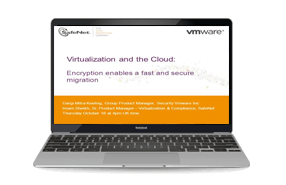
Virtualization and the Cloud: Encryption Enables a Fast and Secure Migration - Webinar
The business benefits and economies of migrating to virtualized and cloud environments are very clear, providing significant cost reduction and system efficiencies, moving to a “pay as you go model”. However, when you move to a dense virtual infrastructure or cloud, you often lose control of the underlying infrastructure, therefore ownership and control of data in that infrastructure. In addition, workloads are mobile yet security is usually tied to underlying infrastructure, removing any assurances that security policies can be enforced as workloads move.
In the journey to virtualization and the cloud, many organizations are still contending with large pools of physical infrastructure. They want to gain the efficiency and lower cost associated with server consolidation and virtualization, but security and audit teams advise them this puts the company’s sensitive data at risk. Automating IT in a private cloud keeps developers and other users in-house and under an organization’s control, but rapid deployment of workload requires agile security.
Join your fellow professionals to first understand the challenges and roadblocks of migrating to the cloud and virtualized environments, and where the data security gaps exist. Then understand how by attaching security to the data itself and managing the encryption keys, you are able to maintain control of your data, prove compliance, and facilitate governance – even in a dense virtual or cloud environment. Virtualization, Hybrid or Public cloud offerings can now be used for broader workloads (including ones containing business critical, sensitive data ie. production servers in addition to test and development), while still delivering the security and compliance requirements needed.
